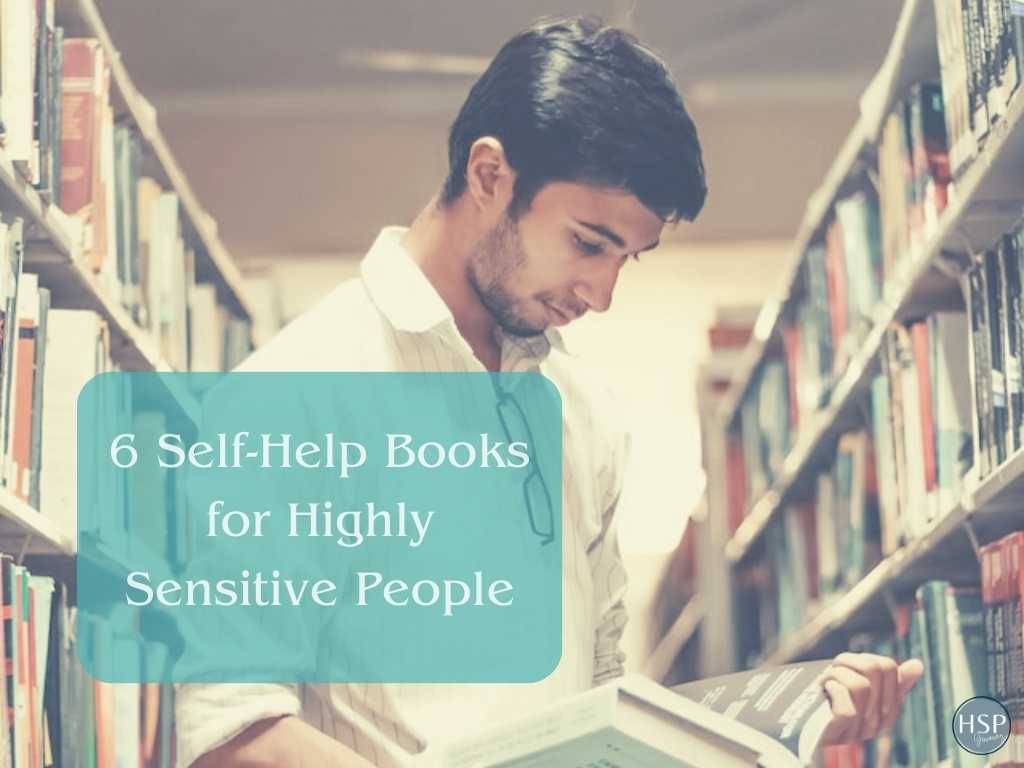Self-help books for highly sensitive people can be valuable resources for individuals who experience heightened emotional responses to external stimuli. I’ve hand-picked some of my favorite self-help books that have appealed to me and helped me over the years. Many HSPs are naturally self-motivated to improve themselves. I’ve often been told that I’m extremely self-aware, which I consider to be a perk of the Highly Sensitive Person Trait.

Table of Contents
Best Self-Help Books for Highly Sensitive People
If you’re someone who feels emotions deeply and is easily overwhelmed by the world around you, you’re not alone. Being highly sensitive is a trait that affects many people, and it can be both a blessing and a curse. While sensitivity can make you more empathetic and attuned to the needs of others, it can also leave you feeling drained and anxious.
Fortunately, there are many self-help books, books on anxiety, and books on the Hightly Sensitive Person Trait that can help highly sensitive people navigate their emotions and find balance in their lives. In this roundup, we’ve compiled a list of the best self-help books for highly sensitive people. Whether you’re looking for practical advice, personal stories, or spiritual guidance, there’s a book on this list that’s sure to resonate with you.
We’ve researched and tested several self-help books for highly sensitive people to identify the ones that offer the most helpful and practical advice.
#1 – The Language of Letting Go: Daily Meditations for Codependents

If you’re looking for a self-help book to help you with letting go of codependency, then The Language of Letting Go: Daily Meditations for Codependents is a great choice.
Pros
- The book is written in a daily meditation format, making it easy to read and follow along.
- The author, Melody Beattie, is a well-known expert in the field of codependency and addiction recovery.
- The book provides practical advice and tools to help you let go of codependent behaviors and live a more fulfilling life.
Cons
- The book was first published in 1990, so some of the language and examples may feel outdated.
- Some readers may find the daily meditation format too repetitive or not engaging enough.
- The book may not be as helpful for those who are not specifically struggling with codependency.
In The Language of Letting Go, Beattie provides daily meditations that are designed to help readers let go of codependent behaviors. Each meditation is short and easy to read, making it perfect for those who may not have a lot of time to dedicate to reading.
The book covers a wide range of topics related to codependency, including setting boundaries, dealing with difficult emotions, and learning to love and care for oneself. Beattie’s writing is clear and concise, making it easy to understand and apply the principles she teaches.
Overall, if you’re struggling with codependency and looking for a practical and easy-to-read self-help book, The Language of Letting Go: Daily Meditations for Codependents is definitely worth checking out.
#2 – Why Has Nobody Told Me This Before?

If you’re a highly sensitive person looking for a self-help book that addresses your unique needs, then Why Has Nobody Told Me This Before? by Dr. Julie Smith is a great option.
Pros
- Provides practical tips and strategies for managing sensitivity
- Written by a mental health professional with experience working with highly sensitive individuals
- Includes personal anecdotes and stories to help readers relate to the content
Cons
- Some readers may find the information repetitive or basic
- May not be as helpful for those with more severe sensitivity-related issues
- Some readers may not appreciate the author’s writing style or tone
In Why Has Nobody Told Me This Before?, Dr. Smith provides a comprehensive guide to managing sensitivity. She covers a wide range of topics, including how to recognize and manage sensory overload, how to set boundaries, and how to communicate effectively with others. The book is written in an accessible and engaging style, making it easy to read and understand.
One of the best things about Why Has Nobody Told Me This Before? is that it’s written by a mental health professional with experience working with highly sensitive individuals. This means that the advice and strategies provided in the book are grounded in research and clinical practice. Additionally, the book includes personal anecdotes and stories from Dr. Smith’s own life and practice, which helps readers relate to the content and feel less alone in their struggles.
However, some readers may find the information in the book repetitive or basic, especially if they’re already familiar with the concept of sensitivity. Additionally, the book may not be as helpful for those with more severe sensitivity-related issues, as it focuses more on general strategies for managing sensitivity rather than specific interventions for more complex issues. Finally, some readers may not appreciate the author’s writing style or tone, which can come across as overly simplistic or condescending at times.
Overall, Why Has Nobody Told Me This Before? is a solid choice for anyone looking for a self-help book on sensitivity. While it may not be perfect for everyone, it provides practical tips and strategies for managing sensitivity and is written by a mental health professional with experience in the field.
#3 – Stop Overthinking: 23 Techniques to Relieve Stress, Stop Negative Spirals, Declutter Your Mind, and Focus on the Present (The Path to Calm)

If you’re a highly sensitive person struggling with overthinking and stress, you should consider purchasing Stop Overthinking: 23 Techniques to Relieve Stress, Stop Negative Spirals, Declutter Your Mind, and Focus on the Present. This book is a great resource for anyone looking to find practical solutions to help them cope with their emotions and thoughts.
Pros
- The book offers a variety of techniques to help you overcome overthinking and stress.
- The author uses simple language and provides relatable examples to help you understand the concepts.
- The book is relatively short and easy to read, making it a great option for busy individuals.
Cons
- Some of the techniques may not work for everyone, and it may take some trial and error to find what works best for you.
- The book is focused on overthinking and stress, so it may not be as helpful for individuals dealing with other mental health issues.
- The book is relatively short, so it may not provide as much in-depth information as some readers may prefer.
Stop Overthinking is a practical guide that offers simple and effective techniques to help you manage your thoughts and emotions. The author’s writing style is engaging and easy to understand, making it a great resource for anyone looking for practical solutions to help them cope with their emotions.
The book is divided into 23 chapters, each focusing on a different technique to help you overcome overthinking and stress. The author provides relatable examples and practical tips to help you understand the concepts and apply them to your life.
One of the strengths of this book is its brevity. At only 200 pages, it’s a quick read that provides a lot of value. However, some readers may find that the book is too short and doesn’t provide enough in-depth information.
Overall, if you’re a highly sensitive person struggling with overthinking and stress, Stop Overthinking is definitely worth checking out. It’s a practical, easy-to-read guide that offers a variety of techniques to help you manage your thoughts and emotions.
#4 – I Hate You–Don’t Leave Me: Understanding the Borderline Personality

If you or someone you know is dealing with borderline personality disorder (BPD), then this book is a must-read.
Pros
- Provides insight and understanding into BPD
- Offers practical advice for coping with BPD
- Written in an engaging and accessible style
Cons
- Can be stigmatizing for those with BPD
- Some information may be outdated
- Not a substitute for professional therapy
If you are looking for a book that can help you understand and cope with borderline personality disorder, then “I Hate You–Don’t Leave Me” is an excellent choice. This book provides valuable insights into the nature of BPD and offers practical advice for dealing with its symptoms.
One of the strengths of this book is its engaging and accessible writing style. The authors use real-life examples and case studies to illustrate their points, making the material both informative and relatable.
However, it is important to note that some of the information in this book may be outdated. Additionally, some readers may find the book stigmatizing or offensive, particularly those with BPD. It is important to approach the material with an open mind and to seek professional help if needed.
Overall, “I Hate You–Don’t Leave Me” is a valuable resource for anyone dealing with BPD, whether personally or professionally.
#5 – Stop Walking on Eggshells: Taking Your Life Back When Someone You Care About Has Borderline Personality Disorder

If you are dealing with someone who has borderline personality disorder, this book is a must-read. It offers a balanced and matter-of-fact approach to understanding the disorder and provides helpful tips on how to take control of your life.
Pros
- Provides a clear understanding of borderline personality disorder
- Offers practical advice on how to deal with someone who has the disorder
- Helps readers take control of their own lives
Cons
- May not be suitable for those who are not dealing with someone who has borderline personality disorder
- Some readers may find the writing style a bit dry
- The book may be too long for some readers
Stop Walking on Eggshells: Taking Your Life Back When Someone You Care About Has Borderline Personality Disorder is a comprehensive guide to understanding borderline personality disorder and its impact on those around the person who has the disorder. The book provides a clear and concise explanation of the disorder and its symptoms, as well as practical advice on how to deal with someone who has the disorder.
The book is written in a straightforward and easy-to-understand manner, making it accessible to a wide range of readers. The authors draw on their own experiences and the experiences of others to provide real-world examples of how to deal with the challenges of living with someone who has borderline personality disorder.
Stop Walking on Eggshells: Taking Your Life Back When Someone You Care About Has Borderline Personality Disorder is an essential resource for anyone who is dealing with someone who has borderline personality disorder. Whether you are a family member, friend, or caregiver, this book will provide you with the tools you need to take control of your own life and help the person you care about.
#6 – Journey to the Heart: Daily Meditations on the Path to Freeing Your Soul

If you’re looking for a daily meditation book to help you on your journey to self-discovery, then Journey to the Heart: Daily Meditations on the Path to Freeing Your Soul is a great choice.
Pros
- The daily meditations are short and easy to read, making it easy to incorporate into your daily routine.
- The meditations are insightful and thought-provoking, making it a great tool for self-reflection and personal growth.
- The book is well-written and beautifully designed, making it a pleasure to read.
Cons
- Some of the meditations may not resonate with everyone, as they are based on the author’s personal experiences and beliefs.
- The book is quite old, and some of the language and ideas may feel outdated to some readers.
- The daily meditations may become repetitive over time, as there are only 365 of them.
If you’re looking for a daily meditation book that will help you on your journey to self-discovery, then Journey to the Heart: Daily Meditations on the Path to Freeing Your Soul is definitely worth checking out. The daily meditations are short and easy to read, making it easy to incorporate into your daily routine. The meditations are insightful and thought-provoking, making it a great tool for self-reflection and personal growth. The book is also well-written and beautifully designed, making it a pleasure to read.
However, some of the meditations may not resonate with everyone, as they are based on the author’s personal experiences and beliefs. Additionally, the book is quite old, and some of the language and ideas may feel outdated to some readers. Finally, the daily meditations may become repetitive over time, as there are only 365 of them.
Buying Guide
When it comes to choosing a self-help book for highly sensitive people, there are several factors to consider to ensure you get the best product for your needs. Here are some things to keep in mind when making your purchase:
Focus on Your Specific Needs
Highly sensitive people can have different challenges and areas of focus. Some may struggle with anxiety, while others may have difficulty setting boundaries. Before choosing a book, identify your specific needs and look for titles that address those areas.
Check the Author’s Credentials
It’s important to choose a book written by a qualified author. Look for books written by professionals with experience in the field of psychology or mental health. You can also check for reviews or recommendations from other readers to get an idea of the author’s credibility.
Consider the Writing Style
The writing style of a self-help book can greatly impact how useful it is to the reader. Look for books that are easy to read and understand, with clear and concise language. Avoid books that use overly complicated language or jargon that may be difficult to follow.
Look for Practical Strategies
The best self-help books offer practical strategies that readers can apply to their lives. Look for books that provide actionable steps and exercises to help you implement the concepts discussed in the book. Additionally, look for books that offer real-life examples and case studies to help you better understand how to apply the strategies in your own life.
By keeping these factors in mind, you can find a self-help book that is tailored to your specific needs and offers practical strategies to help you thrive as a highly sensitive person.




